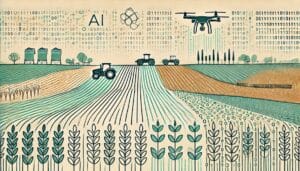What exactly is Open Data, and why is it so important?
I’ve been asked this question numerous times, and it’s especially pertinent in the food and beverage industry. Thus, I will try to provide a concise and comprehensive response.
Open data refers to the idea that certain data should be freely available to the public, without restrictions on its use, reuse, or redistribution. It refers to the concept of making data accessible to anyone, in a machine-readable format, with minimal legal or technical barriers. Open data encompasses various types of information, such as government records, scientific research, weather data, transportation data, and more.
The importance of open data lies in several key factors:
Transparency and Accountability
Open data promotes transparency by allowing citizens to access and examine information that was previously inaccessible or difficult to obtain. It enables citizens to hold governments, organisations, and institutions accountable for their actions and decisions. By providing insights into how public resources are allocated and used, open data helps reduce corruption and foster trust.
Innovation and Economic Growth
Open data serves as a valuable resource for entrepreneurs, businesses, researchers, and developers to create innovative solutions and applications. By making data available to a broader audience, open data stimulates economic growth, encourages entrepreneurship, and drives job creation. It allows individuals and organisations to analyse data, identify patterns, and develop new products, services, and insights.
Collaboration and Civic Engagement
Open data encourages collaboration and participation between governments, civil society, and the general public. By providing access to data, it enables citizens to engage in the decision-making processes, contribute their expertise, and collaborate with governments and organisations to address societal challenges. Open data facilitates the co-creation of knowledge and encourages collective problem-solving.
Evidence-Based Decision Making
Open data plays a crucial role in evidence-based decision making by providing reliable and up-to-date information for policymakers, researchers, and analysts. By having access to high-quality data, policymakers can base their decisions on objective evidence, leading to more informed and effective policies. Open data also allows researchers to validate findings, reproduce experiments, and build upon existing knowledge.
Social Impact and Empowerment
Open data has the potential to empower marginalised communities and promote social inclusion. By making information freely available, open data reduces information asymmetry and empowers individuals with knowledge. It enables communities to understand and address social, economic, and environmental challenges, leading to more inclusive and equitable development.
Scientific Progress and Collaboration
Open data accelerates scientific progress by facilitating data sharing among researchers and institutions. It allows scientists to access and analyse data from various sources, collaborate on interdisciplinary projects, and validate research findings. Open data promotes reproducibility, fosters scientific integrity, and encourages the exchange of knowledge.
Summarising, open data has the potential to transform how societies function, increasing transparency, driving innovation, empowering individuals, and fostering collaboration. By unlocking the value of data and making it freely accessible, open data can contribute to solving complex problems, improving decision making, and creating a more inclusive and prosperous world.
The Importance of Open Data in the Food & Beverage Industry
Open data plays a crucial role in the food and beverage industry, offering numerous benefits to various stakeholders, including consumers, businesses, policymakers, and researchers. Here are some key reasons why open data is important in this industry:
Transparency and Consumer Trust
Open data promotes transparency by providing access to information about food production, processing, and safety. Consumers can make informed choices about the products they purchase, considering factors such as nutritional content, ingredients, allergens, and sourcing. Access to open data builds trust between consumers and businesses, as it demonstrates a commitment to openness and accountability.
Food Safety and Quality
Open data enables the tracking and monitoring of food safety and quality throughout the supply chain. By sharing data on foodborne illnesses, recalls, and inspections, stakeholders can identify patterns, pinpoint potential risks, and take preventive measures. Open data also facilitates collaboration between industry players, regulators, and public health agencies, leading to more effective food safety protocols and faster responses to outbreaks.
Innovation and Market Insights
Open data fuels innovation in the food and beverage industry. Researchers and entrepreneurs can access diverse datasets to identify emerging trends, consumer preferences, and market gaps. This information can drive the development of new products, processes, and business models. Open data also encourages collaboration and knowledge sharing, fostering a culture of innovation and entrepreneurship.
Sustainable Practices
Open data contributes to sustainable practices in the food and beverage industry. By sharing data on agricultural practices, water usage, energy consumption, and waste management, stakeholders can identify opportunities to reduce environmental impact. Access to open data allows for the development of sustainable farming techniques, efficient supply chains, and circular economy initiatives, leading to reduced food waste and better resource management.
Policy Development and Decision-making
Open data supports evidence-based policy development and decision-making in the food and beverage sector. Policymakers can access comprehensive datasets on nutrition, food accessibility, and economic indicators to formulate effective regulations and initiatives. Open data empowers policymakers with accurate information, enabling them to address public health concerns, support small-scale producers, and promote equitable access to nutritious food.
Collaboration and Partnerships
Open data facilitates collaboration and partnerships among diverse stakeholders. By openly sharing data, organisations can work together to address common challenges, such as food security, supply chain resilience, and sustainable agriculture. Open data platforms encourage the exchange of knowledge, expertise, and best practices, leading to more efficient and impactful collaborations.
In summary, open data is essential in the food and beverage industry as it promotes transparency, food safety, innovation, sustainability, evidence-based policymaking, and collaboration. By harnessing the power of data, the industry can drive positive change, enhance consumer trust, and achieve more sustainable and resilient food systems.
Stay updated with the latest AI news. Subscribe now for free email updates. We respect your privacy, do not spam, and comply with GDPR.




